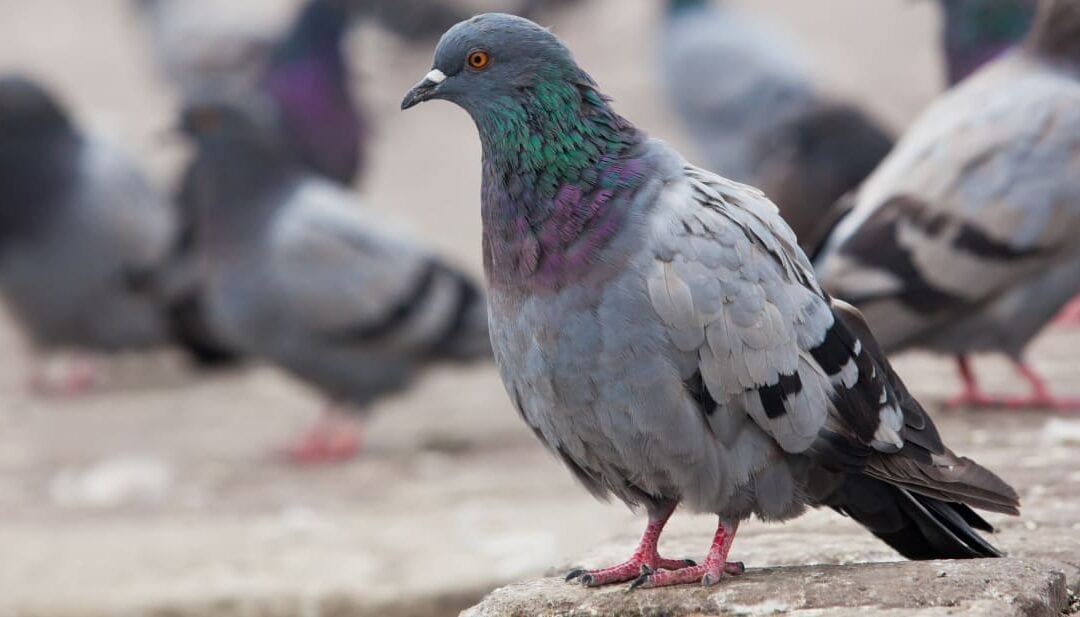
by Pigeon Patrol | Sep 7, 2023 | Bird Spike, Pigeon Control, Pigeon Droppings, Pigeon Patrol's Services, Pigeon Predators, Pigeon Spikes, Pigeons
Nature-loving homeowners like to put out feeders and plant certain flowers and shrubs, to lure birds into their backyards. That’s because birds not only lend more vigor and melody to the life of a garden, but they are also responsible for pollination and pest control.
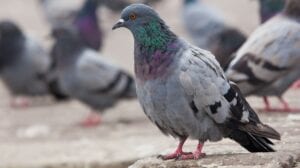
Indeed, birds-caping – or designing your garden to entice local birds – has become increasingly popular among home gardeners these days.
But not every gardener wants birds sauntering onto their garden plots. Pigeons will devour entire heads of cabbage in the afternoon. Crows destroy corn crops by the acre in the countryside, and bluejays will loot your berry bushes almost completely bare of fruit.
The Right Way to Keep Birds Out of Your Vegetable Garden
Still, the wise gardener understands that birds perform an important function in the ecosystem. We recognize why we should ensure that avian populations don’t dwindle any faster than they are dwindling now.
So, below are seven ways to protect your backyard harvests without harming unwanted birds.
1. Scarecrows
Scarecrows, of course, are an obvious solution against birds. But if your makeshift sentry has been posted in the same spot for an extended period now, then birds will have already concluded that he’s harmless.
You need to move your scarecrow’s post a few times around each week. You have to change his clothes, too, to convince the birds that he’s not just a stationary defense tactic, but an actual, mobile threat.
Some gardeners use reflective objects such as old compact discs to keep local birds away. You should also move and rearrange those frequently. Birds catch on surprisingly quickly despite the connotations of the term “bird-brained.”
2. Butterfly Netting
Barriers are among the most effective ways to deter birds from your garden. Butterfly netting protects crops from birds while allowing smaller beneficial insects access to your crops to ensure pollination.
Experts suggest that you keep your netting pulled taught, and use netting with holes smaller than one centimeter to avoid injuring birds.
Be sure you invest in high-quality, UV-resistant netting materials. They may be a bit more expensive, but higher-quality netting will last a lifetime. Cheaper netting tends to fray and deteriorate, becoming a potentially dangerous snag for birds.
3. Chicken Wire
Charles Barnard, an English ironmonger, invented chicken wire in 1844 as a cheap and easy way to keep small animals and poultry penned in one area. You can use the same principle and material to keep birds out of your vegetable plots.
Pin chicken wire to the ground to protect newly-planted seeds or freshly-sown tubers from birds or even chickens scratching and pecking at the soil. As your seedlings start to grow, you can lift the wire off the ground on stakes for additional protection.
4. Garden Fleece
Gardeners often install garden fleece to protect crops from frost in cold weather months, but you can also use it year-round to shield your crops from birds. Drape the fine, white material over your vegetable patch to keep the birds in your neighborhood from harvesting your greens.
Weigh the sides down with rocks or pegs. You can always roll back the fleece when harvest season comes around.
5. Protective Plants
Pigeons, be they wood or rock doves, are rapacious devourers of vegetables in the cabbage family. They are quite persistent and will return to your patch every day until your entire crop is gone. If you don’t have a devoted terrier to shoo them away, you need another plan.
If you are simply not a fan of netting and cages, you can try confusing pigeons by surrounding your cabbage patch with annuals. Plant a dense barrier of calendulas, nemophila, cornflowers, field poppies, and other shorter-growing wildflowers around your plot.
The look is pleasing, inconspicuous and, as a deterrent against pigeons, the strategy does work. Pigeons do not like to wade through lush flowers. They are naturally wary of what may lurk underneath.
6. Toy Predators
Decoy predators – such as toy owls, falcons, or other birds of prey – can help deter birds from ravaging your garden’s harvests. However, like the scarecrow, if these stationary decoys are not relocated often, birds will soon learn that they are harmless.
Moving your toy owls and decoy predators around in the garden will keep neighborhood birds from swooping in to consume your harvest. Decoys that move or make a sound are even better at deterring birds.
7. Stick Barriers
Push sticks and small twigs into the ground around your vegetable patch to create a small forest of sticks. Birds will likely notice the menacing sticks barring their way instead of the vegetables you want to protect.
Source
Pigeon Patrol Products & Services is the leading manufacturer and distributor or bird deterrent (control) products in Canada. Pigeon Patrol products have solved pest bird problems in industrial, commercial, and residential settings since 2000, by using safe and humane bird
deterrents with only bird and animal friendly solutions. At Pigeon Patrol, we manufacture and offer a variety of bird deterrents, ranging from Ultra-flex Bird Spikes with UV protection, Bird Netting, 4-S Bird Gel and the best Ultrasonic and audible sound devices on the market today.
Voted Best Canadian wholesaler for Bird Deterrent products ten years in a row.
Contact us at 1 877-4-NO-BIRD,(604) 585-9279 or visit our website at www.pigeonpatrol.ca
Pigeon/Pigeon Patrol / Pigeons Roosing / Vancouver Pigeon Control / Bird Spikes / Bird Control / Bird Deterrent / PIgeon Deterrent / Surrey Pigeon Control / Pest / Seagull deterrent / Vancouver Pigeon Blog / Birds Inside Home / Pigeons in the cities / Ice Pigeons / What to do about pigeons / sparrows, Damage by Sparrows, How to Keep Raccoons Away, Why Are Raccoons Considered Pests / De-fence / Pigeon Nesting / Bird Droppings / Pigeon Dropping / woodpecker control / Professional Bird Control Company / Keep The Birds Away / Birds/rats/seagull/pigeon/woodpecker/dove/sparrow/pidgeon control/pidgeon problem/pidgeon control/flying rats/pigeon problems/ bird netting/bird gel/bird spray/bird nails/bird guard
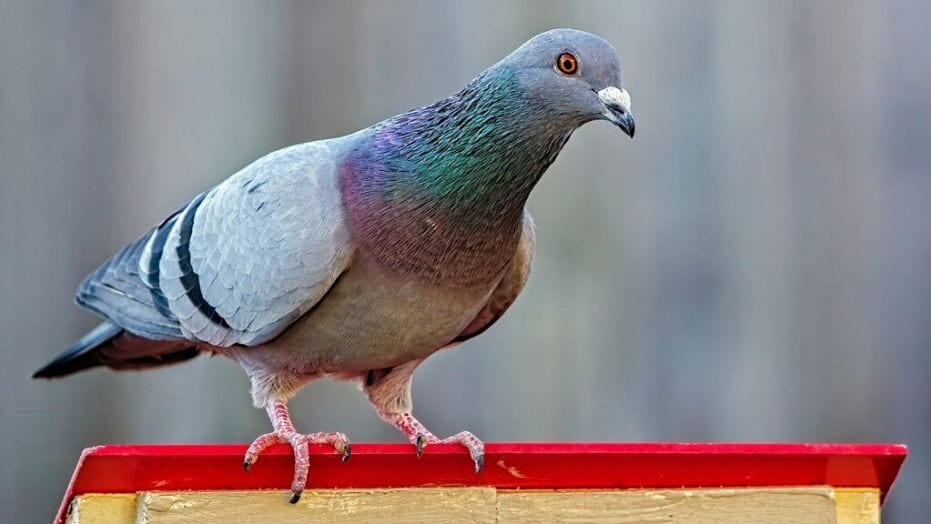
by Pigeon Patrol | Sep 7, 2023 | history of pigeons, MBCA, pet bird, Pigeon Control, Pigeon Droppings, Pigeon Patrol's Services, Pigeon Predators
We all are well aware of the fact that how films, web series, and TV serials have romanticized the idea of symbolizing birds such as pigeons and sparrows as a symbol of love and peace. However, the truth is completely different from what we see on the screen. If these birds become unpaid tenants of your little balcony, you are surely going to encounter the nuisance they create. Thus, many homeowners opt for Sparrow Netting or Pigeon Netting to keep them at bay.
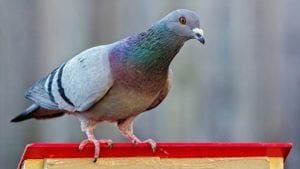
In addition, during the summer season, it becomes extremely important to place pigeon netting for balconies to get rid of all the chaos they bring with them. You may wonder how these little pests can cause substantial damage to your family’s health and also to your property. Well, they can and that is the reason why various residential and industrial spaces in rural and urban areas rely on anti bird netting services.
With that being said, this write-up is specially dedicated to discussing why anti bird netting becomes crucial during the Indian summer season. The comprehensive guide will also shed some light on the key features of HiCare’s bird netting in Pune, Mumbai, and other Indian cities.
Birds are Dirty Beings
Yes, believe it or not, they are. And, if you don’t you can check out the surface of a car parking in the open space or benches of the park. Now, just imagine that a bunch of birds are enjoying the shade under your balcony. Once they leave, you are likely to spot their droppings. It is a treat for all the balcony gardeners as a large amount of their dropping can harm vegetation.
Birds Can Cause Illness
Diseases such as pigeon ornithosis, encephalitis, and salmonella food poisoning have all been linked to pigeons. However, determining the true incidence of illness transmission from pigeons to humans is problematic. Disease outbreaks that may be traced back to pigeon flocks are uncommon. Hence, another strong reason for subscribing to bird netting in Pune, Mumbai, or any other metropolitan city of India.
Pigeon excrement contains the causal agent of histoplasmosis, a systemic fungal illness that affects the human respiratory tract if allowed to accumulate for several years. Histoplasmosis can be lethal in extreme cases. Pigeons’ external parasites include a variety of mites, fleas, ticks, and bugs.
More than anything else, pigeons can be a threat to human safety. Thus, the elimination of feeding, watering, roosting, and nesting sites is important during summer, winter, or any Indian season. As birds pose serious concerns to gardeners and property owners, bird netting services can act as a barrier to letting them in your sweet home. With that being said, here are four benefits of Bird Netting installation in summer. Scroll down to take a brief look at each!
Top 4 Benefits of Bird Netting
- Long-Term Protection
- Durable and Sturdy
- Cost-Effective
- Simple to Use
- Disease Prevention
- Environmentally Friendly
- Low Maintenance
1. Long-Term Protection
During summer, birds often come in their numbers to attack your balcony causing significant damage to the surroundings. To counter this, the net is an effective way to offer the right protection to complete your space from bird damage.
2. Durable and Sturdy
Nets are made of the strongest, highest-quality materials, come in a variety of shapes and sizes, and are UV-stabilized. Some nets have been estimated to last up to several years. Anti-bird netting pays off in terms of durability, which is important in any worthwhile investment. The setup is basic and straightforward.
3. Cost-Effective
Nets are made of the strongest, highest-quality materials, come in a variety of shapes and sizes, and are UV-stabilized. Some nets have been estimated to last up to several years. Anti-bird netting pays off in terms of durability, which is essential in any worthwhile investment.
4. Simple to Use
The netting is exceptionally simple to use and easy to install. The process is hassle-free and professionals can do it within a given timeframe. Once installed properly, it does not require any external force to come into action.
Many reasons and benefits can lure more homeowners to install pigeon netting for balconies. However, finding the best professionals that give Bird Netting Services in Mumbai or any Indian city could be a bit difficult. On the flip side, it is not impossible either. If your browser history is filled with the query – Bird Netting Mumbai, HiCare has a solution for you.
5. Disease Prevention
Bird droppings can contain harmful pathogens and bacteria. By keeping birds away from areas where people live and work, bird netting reduces the risk of diseases transmitted through contact with bird droppings. This is especially crucial in urban environments.
6. Environmentally Friendly
Bird netting is considered an environmentally friendly bird control method because it does not harm the birds. Instead, it provides a physical barrier that discourages birds from accessing certain areas without causing them harm. This makes it a humane and sustainable solution.
7. Low Maintenance
Once bird netting is properly installed, it requires minimal maintenance. Routine inspections to check for damage and repairs as needed are typically the only maintenance tasks required. This saves time and effort compared to other bird control methods.
Source
Pigeon Patrol Products & Services is the leading manufacturer and distributor or bird deterrent (control) products in Canada. Pigeon Patrol products have solved pest bird problems in industrial, commercial, and residential settings since 2000, by using safe and humane bird
deterrents with only bird and animal friendly solutions. At Pigeon Patrol, we manufacture and offer a variety of bird deterrents, ranging from Ultra-flex Bird Spikes with UV protection, Bird Netting, 4-S Bird Gel and the best Ultrasonic and audible sound devices on the market today.
Voted Best Canadian wholesaler for Bird Deterrent products ten years in a row.
Contact us at 1 877-4-NO-BIRD,(604) 585-9279 or visit our website at www.pigeonpatrol.ca
Pigeon/Pigeon Patrol / Pigeons Roosing / Vancouver Pigeon Control / Bird Spikes / Bird Control / Bird Deterrent / PIgeon Deterrent / Surrey Pigeon Control / Pest / Seagull deterrent / Vancouver Pigeon Blog / Birds Inside Home / Pigeons in the cities / Ice Pigeons / What to do about pigeons / sparrows, Damage by Sparrows, How to Keep Raccoons Away, Why Are Raccoons Considered Pests / De-fence / Pigeon Nesting / Bird Droppings / Pigeon Dropping / woodpecker control / Professional Bird Control Company / Keep The Birds Away / Birds/rats/seagull/pigeon/woodpecker/dove/sparrow/pidgeon control/pidgeon problem/pidgeon control/flying rats/pigeon problems/ bird netting/bird gel/bird spray/bird nails/bird guard

by Pigeon Patrol | Jul 26, 2023 | history of pigeons, MBCA, pet bird, Pigeon Control, Pigeon Droppings, Pigeon Patrol's Services, Pigeon Predators
Do you have a problem with pigeons in your home? Not only can this be frustrating, but pigeons can also carry germs that can have a negative impact on your health. This is why it is important to seek expert pigeon removal. With that in mind, in this blog post, we are going to reveal everything you need to know about pigeon removal, including some of the steps you can take to keep pigeons away from your home.

Why pigeons are dangerous
You may have heard that pigeons carry diseases. This information is true. In fact, pigeons spread an alarming number of diseases, as they carry more than 60 varieties of pathogens. Diseases are transmitted via pigeon droppings. Of course, you can make sure that you never pick up or touch pigeon droppings. Nevertheless, it is a little bit more complicated than that. When pigeon droppings that are infected with viruses or bacteria are left on windowsills or pavements, for example, they will start to dry out. When this happens, the droppings then turn into a powder. The powder is either kicked into the air or blown about, which causes it to be inhaled by people without them knowing. When this powder is inhaled in this manner, this is how diseases can be spread to humans.
What are some of the common pathogens that pigeons can transmit to humans?
There are a number of different pathogens that humans can transmit to humans, so let’s take a look at them in further detail:
- Salmonellosis – This is a disease that you are probably more familiar with in terms of food poisoning. This disease when the infected droppings of a pigeon turn into dust, as mentioned earlier, and ends up finding its way to food preparation surfaces and food.
- Candidiasis – This disease is a respiratory condition that happens as a consequence of the years or fungus that is found within pigeon droppings. The areas that are impacted by this type of disease include the respiratory system, mouth, and skin, as well as the intestines and also the urogenital tract, especially in females.
- Histoplasmosis – This is a respiratory disease that can happen as a consequence of the fungus that grows in pigeon droppings. This disease can be fatal.
- St. Louis encephalitis – This is a form of the disease that mosquitoes spread once they have fed on a pigeon that carries this disease. This results in inflammation of the nervous system, which can be a big concern no matter how old you are. Nevertheless, it can be especially serious and sometimes even fatal in those who are 60-years-old or older. Symptoms include fever, headache, and drowsiness.
- E.coli – Last but not least, there is e.coli, which happens when bird droppings land in a supply of food or water, after which they are consumed by humans. By washing food before eating, you should be able to avoid this. Symptoms include the likes of cramps, fever, and nausea.
It is also worth pointing out that pigeons carry the West Nile virus, as well as carrying fleas and mites, all of which can result in discomfort and a number of severe medical problems for humans.
How to keep pigeons away from your home
There are several different steps that you can take to try and keep pigeons away from your property. One of the things that you can do is make the roosting areas as unappealing as possible. Here are some of the best opinions here:
- Don’t feed them – This may sound obvious, but it is important to make sure that you do not feed the pigeons. As is the case with the majority of animals, if you feed them, they are only going to keep coming back. Plus, the food may attract even more pigeons and potentially other animals as well!
- Install coping covers to window ledges and sills – If you do not have any flat surfaces for nests to be built and balanced on, the pigeons are probably going to move elsewhere and find a different home.
- Tie a string across the roosting area – Strings that are tied approximately one-inch
- Install anti-roosting spike stripes – Select strategical sports for the installation of anti-roosting spike strips. This includes the likes of window ledges and sills.
It is also a wise idea to inspect the outside of your home and to make sure there are no entry points for pigeons. Pay special attention to your attic and eaves. If any openings are present, you should seal them. You can start by sealing the attic should there by any openings that are large enough for a pigeon to get through them. You can either place a metal wire mesh or you could seal the openings completely.
Next, you should cap your chimney if your home has one. Using a metal wire cage to cap your chimney is a wise idea because pigeons are well known for creating nests that can block this area of your home. A bird could die through getting trapped inside of the chimney as well, so blocking off the chimney is better all around!
In addition to this, you should use netting or mesh surrounding the nesting areas. This is advisable especially for those that have air conditioning units in their home. This is because pigeons love to create their nests on trays underneath the unit.
Of course, you can also hire professionals to make sure that there are some strategies in place so that pigeons are deterred from your property.
Source
Pigeon Patrol Products & Services is the leading manufacturer and distributor or bird deterrent (control) products in Canada. Pigeon Patrol products have solved pest bird problems in industrial, commercial, and residential settings since 2000, by using safe and humane bird
deterrents with only bird and animal friendly solutions. At Pigeon Patrol, we manufacture and offer a variety of bird deterrents, ranging from Ultra-flex Bird Spikes with UV protection, Bird Netting, 4-S Bird Gel and the best Ultrasonic and audible sound devices on the market today.
Voted Best Canadian wholesaler for Bird Deterrent products ten years in a row.
Contact us at 1 877-4-NO-BIRD,(604) 585-9279 or visit our website at www.pigeonpatrol.ca
Pigeon/Pigeon Patrol / Pigeons Roosing / Vancouver Pigeon Control / Bird Spikes / Bird Control / Bird Deterrent / PIgeon Deterrent / Surrey Pigeon Control / Pest / Seagull deterrent / Vancouver Pigeon Blog / Birds Inside Home / Pigeons in the cities / Ice Pigeons / What to do about pigeons / sparrows, Damage by Sparrows, How to Keep Raccoons Away, Why Are Raccoons Considered Pests / De-fence / Pigeon Nesting / Bird Droppings / Pigeon Dropping / woodpecker control / Professional Bird Control Company / Keep The Birds Away / Birds/rats/seagull/pigeon/woodpecker/dove/sparrow/pidgeon control/pidgeon problem/pidgeon control/flying rats/pigeon problems/ bird netting/bird gel/bird spray/bird nails/bird guard
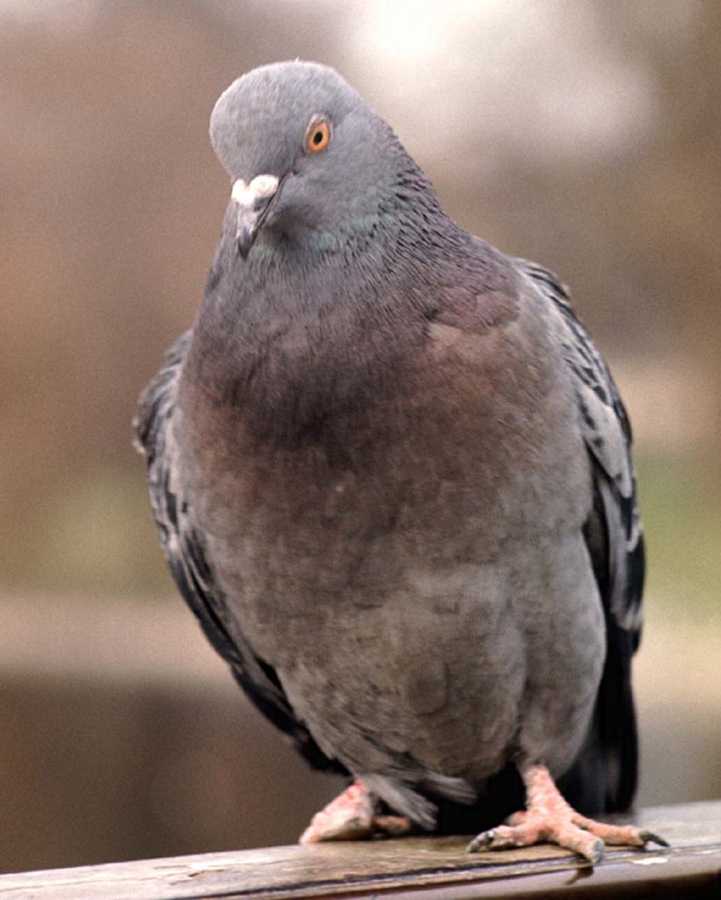
by Pigeon Patrol | Jul 20, 2023 | Bird Spike, Pigeon Droppings, Pigeon Patrol's Services, Pigeon Predators, Pigeon Spikes, Pigeons, Pigeons in the News
Chickens bob their heads while walking. So do cranes, magpies and quails. In fact, head bobbing is a unique feature in birds and occurs in at least 8 of the 27 families of birds.
There are a few theories why some birds bob their heads when they walk:
- Assists with balance
- Provides depth perception
- Sharpens their vision
However, most studies suggest that birds in motion bob their heads to stabilize their visual surroundings. In comparison, we rely more on our eye movements, not our head movements, to catch and hold images while in motion.
Picture a pigeon on a moving treadmill. What do you think would happen as the pigeon walks with the speed of the treadmill and its environment remains relatively the same? Dr. Barrie J Frost (1978) did this experiment and the pigeon’s head did not bob.
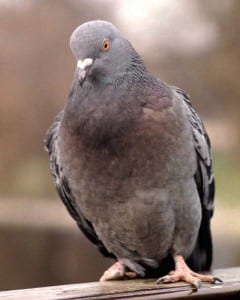
Dr. Mark Friedman (1975) also conducted a series of experiments to test the head bobbing actions of birds, using doves. His research demonstrated that the head movement is controlled more by visual stimulation than movement of the body.
Scientists continue to research head bobbing in birds. For example, scientists are currently investigating question such as “Why do some birds exhibit head bobbing, while other do not?” For more information on this topic see the related Web sites section.
Source
Pigeon Patrol Products & Services is the leading manufacturer and distributor or bird deterrent (control) products in Canada. Pigeon Patrol products have solved pest bird problems in industrial, commercial, and residential settings since 2000, by using safe and humane bird
deterrents with only bird and animal friendly solutions. At Pigeon Patrol, we manufacture and offer a variety of bird deterrents, ranging from Ultra-flex Bird Spikes with UV protection, Bird Netting, 4-S Bird Gel and the best Ultrasonic and audible sound devices on the market today.
Voted Best Canadian wholesaler for Bird Deterrent products ten years in a row.
Contact us at 1 877-4-NO-BIRD,(604) 585-9279 or visit our website at www.pigeonpatrol.ca
Pigeon/Pigeon Patrol / Pigeons Roosing / Vancouver Pigeon Control / Bird Spikes / Bird Control / Bird Deterrent / PIgeon Deterrent / Surrey Pigeon Control / Pest / Seagull deterrent / Vancouver Pigeon Blog / Birds Inside Home / Pigeons in the cities / Ice Pigeons / What to do about pigeons / sparrows, Damage by Sparrows, How to Keep Raccoons Away, Why Are Raccoons Considered Pests / De-fence / Pigeon Nesting / Bird Droppings / Pigeon Dropping / woodpecker control / Professional Bird Control Company / Keep The Birds Away / Birds/rats/seagull/pigeon/woodpecker/dove/sparrow/pidgeon control/pidgeon problem/pidgeon control/flying rats/pigeon problems/ bird netting/bird gel/bird spray/bird nails/bird guard
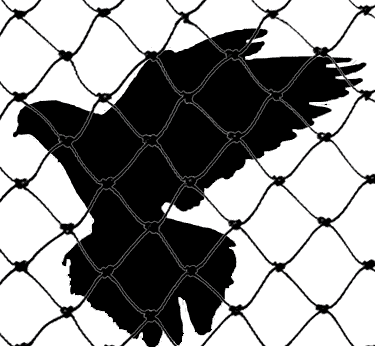
by Pigeon Patrol | Jul 20, 2023 | Columbidae, Doves, history of pigeons, MBCA, pet bird, Pigeon Control, Pigeon Droppings, Pigeon Patrol's Services
New research publishing June 18 in the open-access journal, PLOS Biology, led by Dr Lucy Taylor from the University of Oxford’s Department of Zoology now reveals that homing pigeons fit in one extra wingbeat per second when flying in pairs compared to flying solo.
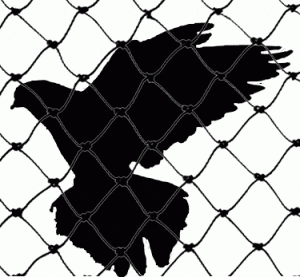
Birds that fly in ‘V’-formations, such as geese, are able to conserve energy by flying in aerodynamically optimal positions. By contrast, in species that don’t fly in formation, such as homing pigeons, the costs and benefits of flocking have been less well understood.
The research indicates that flying with another bird requires more energy compared to flying solo. ‘The results of this study were completely unexpected. Energy is the currency of life so it’s astonishing that the birds are prepared to pay a substantial energetic cost to fly together,” said lead-author, Dr Lucy Taylor.
The team used high frequency GPS and accelerometer bio-loggers to measure how pigeons changed their wingbeat patterns when flying in pairs compared to flying solo. The accelerometers act much like fitness trackers but, instead of measuring steps, the researchers measure wingbeats. ‘The increase in wingbeat frequency is equivalent to Usain Bolt running the 100m sprint at his usual speed, whilst fitting in nearly one extra step per second. The pigeons are flapping faster when flying in pairs but hardly going any faster,” said Dr Taylor.
The increase in wingbeat frequency is likely to be related to the demands of coordinating flight. Dr Taylor said: ‘Imagine trying to coordinate with and avoid hitting another small object travelling at around 44 miles per hour. This is nearly two times faster than an Olympic sprinter, and the birds can move up and down as well as left and right. For a pigeon, flapping your wings faster will both give you faster reactions and greater control over your movements, and will help keep your head stable making it easier to track where the other bird is.’
Despite the costs of fitting in one additional wingbeat per second, the birds consistently chose to fly together, suggesting that they were able to gain other benefits from flocking. Birds flying in a pair were simultaneously able to improve their homing accuracy, meaning that they could conserve energy by flying shorter routes home. Combined with increased predator protection from safety in numbers, this research suggests that the overall benefits of flocking outweigh the immediate energetic costs of changing wingbeat patterns.
Source
Pigeon Patrol Products & Services is the leading manufacturer and distributor or bird deterrent (control) products in Canada. Pigeon Patrol products have solved pest bird problems in industrial, commercial, and residential settings since 2000, by using safe and humane bird
deterrents with only bird and animal friendly solutions. At Pigeon Patrol, we manufacture and offer a variety of bird deterrents, ranging from Ultra-flex Bird Spikes with UV protection, Bird Netting, 4-S Bird Gel and the best Ultrasonic and audible sound devices on the market today.
Voted Best Canadian wholesaler for Bird Deterrent products ten years in a row.
Contact us at 1 877-4-NO-BIRD,(604) 585-9279 or visit our website at www.pigeonpatrol.ca
Pigeon/Pigeon Patrol / Pigeons Roosing / Vancouver Pigeon Control / Bird Spikes / Bird Control / Bird Deterrent / PIgeon Deterrent / Surrey Pigeon Control / Pest / Seagull deterrent / Vancouver Pigeon Blog / Birds Inside Home / Pigeons in the cities / Ice Pigeons / What to do about pigeons / sparrows, Damage by Sparrows, How to Keep Raccoons Away, Why Are Raccoons Considered Pests / De-fence / Pigeon Nesting / Bird Droppings / Pigeon Dropping / woodpecker control / Professional Bird Control Company / Keep The Birds Away / Birds/rats/seagull/pigeon/woodpecker/dove/sparrow/pidgeon control/pidgeon problem/pidgeon control/flying rats/pigeon problems/ bird netting/bird gel/bird spray/bird nails/bird guard
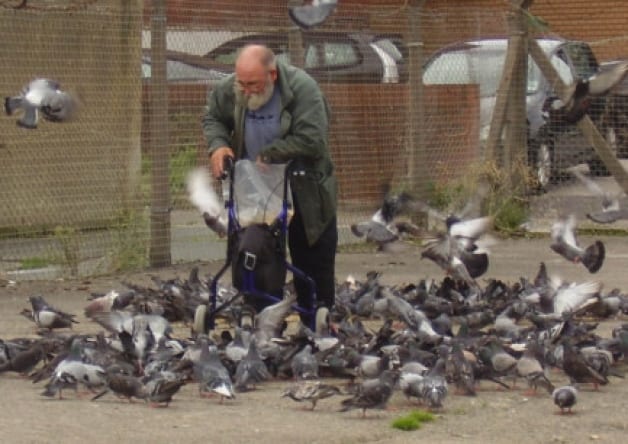
by Pigeon Patrol | Jul 6, 2023 | Bird Spike, Pigeon Droppings, Pigeon Patrol's Services, Pigeon Predators, Pigeon Spikes, Pigeons
Pigeons are often referred to as ‘rats with wings’ and like rats they have adapted well to live side by side with humans in our environment. Vast amounts of buildings and structures provide the perfect perch for pigeons to rest and our food waste and crops provide a healthy supply of food as they will eat anything they can find. Our lifestyle has eliminated any potential predators or competitors so pigeons have been allowed to thrive.
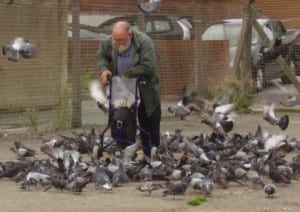
Before you try and deal with a pigeon problem on your own it is important to remember that they are not just your average pest! It requires a level of skill, expertise and a bit of imagination. A control method that works in one instance will not necessarily work in another. This is why it often requires several strategies used in unison. Whether you want to give it a go yourself or just see what options there are you will find all the pigeon control methods you need to know below.
Pigeon Control
Live Pigeon Traps – This is a highly recommended control method. Bob traps work well in most cases. Use a bait, wheat or corn will do, the birds will enter the trap through a one-way door so once inside they can’t get back out. Leave a few pigeons inside the trap as this will encourage more of these social birds into the trap. Only try this method if you are willing to kill the birds once they are caught because releasing them will not solve the problem. Call a professional pest control company if you are unsure.
Exclusion – Exclusion also known as pigeon proofing involves modifying your property to make it inaccessible to pigeons, no place to land means no pigeons! Pigeon spikes, bird slopes, bird netting, bird wires, electrified tracks and wiring can all be effective at deterring pigeons. It requires a level of skill to install thee product so it’s important to remember this before you run off to the shops and buy one of these proofing methods. Pigeon proofing can be expensive but it is also very effective and the short-term cost can save you a lot of money in the long run so it is important that they are installed properly.
Pigeon Repellents – This is a control method that makes a pigeons roosting area inhospitable without causing any harm to the bird. They are often in gel or liquid form, usually, soft, sticky or hot. It irritates the birds when they land making them fly off and find somewhere else. This is a good quick fix; these products are cheap and easy to use. However, the downside is it is only a temporary fix and can be a mess job.
Source
Pigeon Patrol Products & Services is the leading manufacturer and distributor or bird deterrent (control) products in Canada. Pigeon Patrol products have solved pest bird problems in industrial, commercial, and residential settings since 2000, by using safe and humane bird
deterrents with only bird and animal friendly solutions. At Pigeon Patrol, we manufacture and offer a variety of bird deterrents, ranging from Ultra-flex Bird Spikes with UV protection, Bird Netting, 4-S Bird Gel and the best Ultrasonic and audible sound devices on the market today.
Voted Best Canadian wholesaler for Bird Deterrent products ten years in a row.
Contact us at 1 877-4-NO-BIRD,(604) 585-9279 or visit our website at www.pigeonpatrol.ca
Pigeon/Pigeon Patrol / Pigeons Roosing / Vancouver Pigeon Control / Bird Spikes / Bird Control / Bird Deterrent / PIgeon Deterrent / Surrey Pigeon Control / Pest / Seagull deterrent / Vancouver Pigeon Blog / Birds Inside Home / Pigeons in the cities / Ice Pigeons / What to do about pigeons / sparrows, Damage by Sparrows, How to Keep Raccoons Away, Why Are Raccoons Considered Pests / De-fence / Pigeon Nesting / Bird Droppings / Pigeon Dropping / woodpecker control / Professional Bird Control Company / Keep The Birds Away / Birds/rats/seagull/pigeon/woodpecker/dove/sparrow/pidgeon control/pidgeon problem/pidgeon control/flying rats/pigeon problems/ bird netting/bird gel/bird spray/bird nails/bird guard











